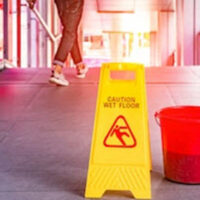“Slip and Fall” Accidents on Private Property

Someone stumbling, tripping, slipping, and ultimately falling can result in very serious injuries. Not every fall is equal – some lead to nothing more than a laugh, and potentially a cherished video that’s replayed at family get-togethers. However, a significant percentage of falls lead to a significant injury. The danger is much higher in the older generations, as elderly people might experience falls more frequently and be more highly impacted when they do fall. You have limited control on who will suffer from a fall, and many falls happen on private property. This leads to the question – who bears responsibility for a fall when it takes place on private property?
Liability in these cases can be complex issues. An experienced slip and fall attorney at Patel Law, PC can discuss the specifics of your case with you. This article will begin a general discussion of premises liability and the concept of reasonable care for private property. For official advice and experienced guidance tailored to your exact needs, contact our office today.
Premises Liability in Illinois
Not every slip and fall can lead to a court judgment. Whether an individual can recover compensation for injuries received in a fall on private property will depend on several factors. One of the key elements is: did the property owner owe a duty of care to the injured person? Also important: why did the person fall?
The existence of a duty of care is held in Illinois state statute 740 ILCS 130/1. This law, aka the Premises Liability Act, establishes that property owners owe a duty of “reasonable care under the circumstances” to “invitees” and “licensees.” This reasonable care is caveated as being reasonable “under the circumstances regarding the state of the premises” or acts that are performed on the premises, or excluded from them.
So, what does that all mean?
Under the Illinois Premises Liability Act, there used to be separate definitions as to who was an “invitee” and who was a “licensee.” In other states, the law operates to separate duties of care you might owe an invited guest, vs someone at the private property for business reasons (such as a hired landscaper.) However, in Illinois this distinction has been abolished, and an “invitee” or licensee is simply anyone who is legally on private property. So long as a person is not trespassing when they enter the property, the property owner owes a duty of care to the “invitee or licensee” standard.
It is important to note that separate considerations can exist for certain trespassers. Contact an experienced attorney at Patel Law PC to discuss.
Defining Reasonable Care for Property Owners
Under a duty of reasonable care, a property owner is responsible for keeping the property in a reasonably safe condition, or providing warning of dangerous conditions that are not readily apparent. This will include a duty to make a reasonable effort to discover/find issues on the property that need to be fixed.
However, “reasonable care” does not require a property owner to identify and address every single potential hazard and keep the property in perfect condition. It would be impossible to predict every potential scenario or freak accident that could occur, no matter how unlikely. A property owner can properly maintain a property that has warned-of hidden dangers, or one that even has readily identifiable, apparent dangers that can be easily avoided.
Caution is Required
A court will not look kindly on a case where a guest seemingly tromped directly into danger, seemingly with no caution/ expecting/wanting to get hurt. Guests on private property are expected to notice obvious hazards and act reasonably to avoid them.
For example, imagine that there is a large dog on a short chain right next to a front door. On the door is a sign that says “Beware of Dog – He Bites.” Not only is the danger clearly visible, it is identified by sign as well.
However – what if the dog was concealed in a tucked-away dog house that was decorated to look like a decorative porch bench? What if the sign was removed? These are the kinds of details your attorney can go through with you in assessing your case.
Contact Patel Law, PC
Contact an experienced Decatur personal injury attorney at Patel Law, PC to discuss the details of your own case today.
Sources:
ilga.gov/Legislation/ILCS/Articles?ActID=2048&ChapterID=57#:~:text=The%20distinction%20under%20the%20common,done%20or%20omitted%20on%20them.
ksdk.com/article/weather/weather-impact/missouri-snow-shoveling-sidewalks-requiements-illinois/63-2359916f-3538-4cd6-a47f-0d157d7d9847
